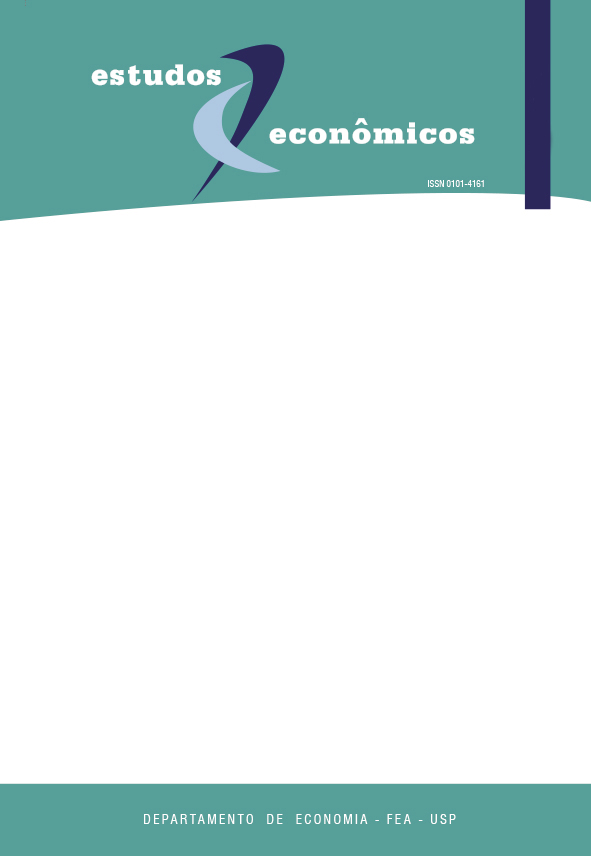Financing pioneering railways in São Paulo: the idiossyncratic case of the estrada de Ferro Sorocabana (1872- 1919)
DOI:
https://doi.org/10.1590/S0101-41612005000100005Keywords:
railways, financial structure, foreign investmentAbstract
The history of the Estrada de Ferro Sorocabana is highly idiosyncratic. Owned and run successively by Brazilian businessmen, the federal government, and the government of the State of São Paulo, it would be rented out to a foreign company over the period 1907-1919. When it began operating, coffee did not represent a significant share of its overall freight receipt, and even later it would not achieve the relevance it did in Mogiana and Paulista, considered the typical "coffee railways." Unlike these two profitable companies, Sorocabana remained in dire financial straits almost throughout the period 1872-1919. This paper focuses on what lay behind its financial distress. The literature on pioneering railway companies in Brazil emphasises that profitability hinged on the type of ownership as well as on whether coffee was the main source of freight receipt. Besides this, the following hypotheses are evaluated: oversanguine expectations about future cash flows; poor management; shortage of governance engendered by its financing structure; bad luck; and bad governmental policy.Downloads
References
AMARAL, Antero F. do. Syndicato Farquhar. Rio de Janeiro, 1915.
CANABRAVA, Alice Piffer. O desenvolvimento da cultura do algodão na província de São Paulo: 1861-1875. São Paulo: Ind. Gráfica Siqueira, 1951.
COMPANHIA SOROCABANA. Relatório apresentado pela directoria da Companhia Sorocabana à assembléia geral dos acionistas. São Paulo: Typographia Americana (various issues).
CUSI. Companhia União Sorocabana e Ituana. Relatório apresentado à assembléia
geral ordinária dos srs. acionistas da Companhia União Sorocabana e Ituana pela sua directoria. Rio de Janeiro: Typographia do Jornal do Comércio (various issues).
DUNCAN, Julian Smith. Public and private operation of railways in Brazil. New York: Columbia University Press, 1932
EICHENGREEN, Barry. Financing infrastructure in developing countries: lessons from the railway age. The World Bank Research Observer, v. 10, n. 1, 1995.
FRANCE. Ministère des Affaires Etrangères. Correspondence politique et commerciale: archives nationales, Série F 12; Série AQ.
GAULD, Charles. The last titan: Percival Farquhar. Stanford: Stanford University Press, 1964.
HANLEY, Anne Gerard. Capital markets in the coffee economy: financial institutions
and economic change in São Paulo, Brazil, 1850-1905. 1995. Tese (Doutorado), Stanford University.
KINDLEBERGER, Charles. Manias, panics, and crashes – A history of financial crises. New York: John Wiley and Sons, 1996.
LEVY, Maria Bárbara. O encilhamento. In: NEUHAUS, Paulo (ed.), Economia brasileira: uma visão histórica. Rio de Janeiro: Editora Campus, 1980.
LEWIS, Colin. Public policy and private initiative railway building in São Paulo 1860-1889.” Institute of Latin American Studies Research Papers. University of London, 1991.
PINTO, Adolpho Augusto. História da viação pública de São Paulo (Brasil). São Paulo: Typ. Vanorden & Cia, 1903.
SAES, Flávio Azevedo Marques de. As ferrovias de São Paulo: Paulista, Mogiana
e Sorocabana (1870-1940). 1974. Dissertação (Mestrado) University of São Paulo, São Paulo. SÃO PAULO. Primeiro traslado de escriptura de arrendamento da Estrada de Ferro Sorocabana. São Paulo: Augusto Siqueira, 1907.
SHLEIFER, Andrei; VISHNY, Robert. A survey of corporate governance. Journal of Finance LII 2, 1997.
SILVA, Clodomiro Pereira da. Desenvolvimento, regimen legal e tarifas das ferrovias de São Paulo. Laemmert & C., 1903.
STIGLITZ, Joseph. The contributions of the economics of information to twentieth century economics. The Quarterly Journal of Economics, v. 115, n. 4, 2000. THE ECONOMIST (various issues).
SUMMERHILL, William. Market intervention in a backward economy: railway subsidy in Brazil, 1854-1913. Economic History Review LI, n.3, 1998. THE RAILWAY NEWS. (various issues).
Downloads
Published
Issue
Section
License
Copyright (c) 2005 Dante Mendes Aldrighi, Flávio A.M. de Saes

This work is licensed under a Creative Commons Attribution-NonCommercial 4.0 International License.
By submitting an article, the author authorizes its publication and attests that it has not been submitted to any other journal. The original article is considered final. Articles selected for publication are proofread for grammatical and orthographic errors. The journal does not pay rights for published articles. The Institute of Economic Research from the School of Economics, Business and Accounting of the University of São Paulo (Instituto de Pesquisas Econômicas da Faculdade de Economia, Administração e Contabilidade da Universidade de São Paulo) owns the journal's copyright.




